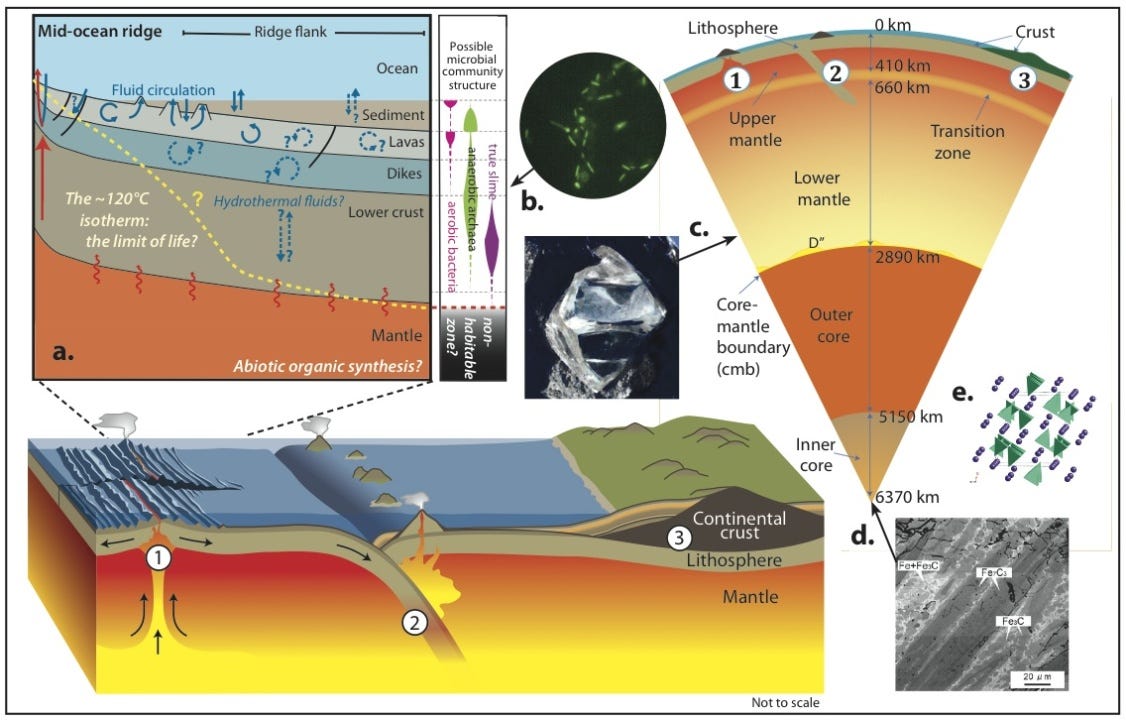The Infinite Black Gold
Unveiling the Truth About the Oil Industry and C. Warren Hunt's Anhydride Theory

For decades, we've been conditioned to believe that oil, the lifeblood of modern civilization, is a finite resource destined to run dry.

This narrative has driven economic policies, fueled geopolitical conflicts, and justified the relentless pursuit of alternative energy sources. But what if everything we've been told about the scarcity of oil is a carefully constructed myth? Enter C. Warren Hunt and his revolutionary anhydride theory of petroleum and coal formation, a paradigm-shifting concept that challenges the very foundation of our understanding of fossil fuels.
Imagine a world where the narrative of oil scarcity is exposed as a myth, a carefully constructed illusion designed to maintain the control and profits of the oil industry. This is precisely the disruptive potential of C. Warren Hunt's anhydride theory of petroleum and coal formation, a groundbreaking idea that could unravel the decades-old myth of finite oil resources. Just as the promise of free electricity challenges the entrenched interests of powerful energy conglomerates, Hunt's theory threatens to upend the lucrative narrative of scarcity that the oil industry thrives on.
The Oil Industry's Profit Motive: A Narrative of Scarcity
For over a century, the oil industry has thrived on the premise that oil is a finite resource. This belief has driven prices up, fueled geopolitical conflicts, and justified massive investments in exploration and extraction technologies. The fear of running out of oil has allowed the industry to maintain high prices and secure vast profits, while also exerting significant influence over global energy policies.
The concept of "peak oil" — the point at which global oil production reaches its maximum rate before entering a terminal decline — has been a powerful tool in maintaining this narrative. By perpetuating the idea that oil is running out, the industry can justify continuous price hikes and secure government subsidies for further exploration and extraction efforts.
The Conventional Narrative
The prevailing theory posits that oil and coal are the remnants of ancient organic matter, buried and subjected to intense heat and pressure over millions of years. According to this view, these resources are finite and will eventually be depleted. This belief has not only shaped our energy policies but also instilled a sense of urgency in finding sustainable alternatives.
C. Warren Hunt's Anhydride Theory: A Game-Changer
In stark contrast, C. Warren Hunt's anhydride theory presents a radical departure from traditional views. Hunt, a respected geologist and former director of the Alberta Geological Survey, proposed that petroleum and coal are not the products of ancient biological matter but are instead formed through abiotic processes deep within the Earth's crust.

Hunt's theory suggests that hydrocarbons are continuously generated by the chemical reactions between minerals and water under high temperature and pressure conditions. This process, known as serpentinization, occurs in the mantle and lower crust, producing hydrocarbons that migrate upwards and accumulate in reservoirs. If Hunt's theory holds true, it implies that the Earth possesses a potentially limitless supply of hydrocarbons, challenging the long-held belief in their impending scarcity.

The Aftermath: Hunt's Struggle for Recognition
Despite the compelling nature of his theory, Hunt faced significant resistance from the established scientific community and the oil industry. The idea that oil is a renewable resource threatened the very foundations of their economic and strategic models. Consequently, Hunt's work was largely ignored or dismissed by mainstream geologists and energy experts.
Hunt's professional life took a turn for the worse after he publicly presented his theory. He was marginalized within the scientific community, his research funding was cut, and he was ultimately forced into early retirement. His theory, though scientifically sound and supported by evidence from various geological sites, was buried under a wave of skepticism and inertia.

The Implications: Reimagining Our Energy Future
If Hunt's anhydride theory were to gain widespread acceptance, it would revolutionize our approach to energy. The fear of running out of oil would dissipate, potentially stabilizing oil prices and reducing the geopolitical tensions surrounding energy resources. It could shift the focus from finding alternatives to improving the efficiency and feasibility of existing low-cost hydrocarbon extraction and usage.
Hunt's Anhydride Theory: A Threat to the Status Quo
C. Warren Hunt's anhydride theory posits that petroleum and coal are continuously generated through abiotic processes deep within the Earth's crust. This revolutionary idea challenges the conventional belief that hydrocarbons are the remnants of ancient organic matter, formed over millions of years. If Hunt's theory is correct, it implies that oil is a renewable resource, undermining the very foundation of the scarcity narrative.
The implications of this theory are profound. If oil is indeed a renewable resource, the industry's justification for high prices and aggressive extraction methods would collapse. The fear of running out of oil, which has driven much of the industry's profitability, would be rendered obsolete.
The Power of Suppressed Science: Lessons from Electricity
The oil industry's resistance to Hunt's theory is reminiscent of the suppression of technologies that could provide free or low-cost electricity. Innovators like Nikola Tesla envisioned a world where energy was abundant and accessible to all, challenging the monopolies of powerful energy corporations. The reluctance to adopt such technologies is driven by the same motive: preserving profits and control.

Free or low-cost electricity would disrupt the current energy market, diminishing the profits of utility companies and reducing the power of energy conglomerates. Similarly, the acceptance of Hunt's anhydride theory would threaten the oil industry's dominance by revealing the abundance of oil resources.
The Rich and Greedy: Protecting Their Interests
The entrenched interests of the rich and powerful have always been adept at protecting their profits. By controlling the narrative around oil scarcity, these interests ensure a steady stream of revenue and maintain their influence over global energy policies. The suppression of Hunt's theory is a testament to the lengths they will go to protect their interests.
Accepting Hunt's theory would not only disrupt the oil industry but also challenge the geopolitical balance of power. Countries that rely heavily on oil exports to maintain their economies would face a seismic shift, while nations that depend on oil imports would gain newfound leverage. The ripple effects of this disruption would be felt across the global economy.

Moving Forward: Embracing Unconventional Ideas
C. Warren Hunt's anhydride theory represents a hidden chapter in the story of our understanding of oil and coal formation. While the mainstream narrative continues to emphasize the finite nature of these resources, Hunt’s theory kick’s the monopolists theory to the curb.
Hunt's anhydride theory, like the promise of free electricity, represents a paradigm shift in our understanding of energy resources. It challenges us to rethink the narratives we've been fed and to question the motives behind them. As we face the dual challenges of energy security and affordability, it is crucial to remain open to unconventional ideas and to explore new possibilities with curiosity and courage to make our wallets great again. This theft and deceit has gone on for far too long.

In the end, the story of oil may not be one of scarcity and decline, but of endless possibility and untapped potential. And it is up to us to explore these possibilities with an open mind and a willingness to defy the status quo.
















This fascinating Anhydride Theory has intriguing resonances with the Primary Water concept, in which primary water is generated deep in the earth as a result of natural geological forces. As people become aware of these possibilities, we could enter an era of empowerment and abundance.
I long suspected Peak Oil was nonsense.